Dante: The Divine Comedy
Purgatorio Cantos VIII-XIV
Authored and translated by A. S. Kline © Copyright 2000, All Rights Reserved.
This work may be freely reproduced, stored and transmitted, electronically or otherwise, for any non-commercial purpose. Conditions and Exceptions apply.
Contents
- Purgatorio Canto VIII:1-45 The Two Angels descend
- Purgatorio Canto VIII:46-84 Nino de’ Visconti
- Purgatorio Canto VIII:85-108 The Serpent
- Purgatorio Canto VIII:109-139 Conrad Malaspina
- Purgatorio Canto IX:1-33 Dante dreams he is clasped by an Eagle
- Purgatorio Canto IX:34-63 Virgil explains
- Purgatorio Canto IX:64-105 The Angel at the Gate of Purgatory
- Purgatorio Canto IX:106-145 The Angel opens the Gate
- Purgatorio Canto X:1-45 The First Terrace: The Frieze: The Annunciation
- Purgatorio Canto X:46-72 King David dancing before the Ark
- Purgatorio Canto X:73-96 The Emperor Trajan
- Purgatorio Canto X:97-139 The Proud and their Punishment
- Purgatorio Canto XI:1-36 The Proud paraphrase the Lord’s Prayer
- Purgatorio Canto XI:37-72 Omberto Aldobrandeschi
- Purgatorio Canto XI:73-117 Oderisi of Gubbio: The Vanity of Fame
- Purgatorio Canto XI:118-142 Provenzan Salvani
- Purgatorio Canto XII:1-63 Many examples of Pride
- Purgatorio Canto XII:64-99 The Angel of Humility
- Purgatorio Canto XII:100-136 The first letter P is now erased
- Purgatorio Canto XIII:1-45 The Second Terrace: The voices in the air
- Purgatorio Canto XIII:46-84 The Envious and their Punishment
- Purgatorio Canto XIII:85-154 Sapia de’ Saracini
- Purgatorio Canto XIV:1-27 Guido del Duca and Rinieri da Calboli
- Purgatorio Canto XIV:28-66 The Valley of the Arno
- Purgatorio Canto XIV:67-123 Guido’s diatribe against Romagna
- Purgatorio Canto XIV:124-151 Examples of Envy
Purgatorio Canto VIII:1-45 The Two Angels descend
It was now that hour which makes the thoughts, of those who voyage, turn back, and melts their hearts, on the day when they have said goodbye to their sweet friends; and which pierces the new pilgrim with love, when he hears the distant chimes, that seem to mourn the dying day; when I began to neglect my sense of hearing, and to gaze, at one of the spirits, who rose, and begged a hearing with his hand.
He joined his palms, and raised them, fixing his eyes on the east, as though saying, to God: ‘I care for nothing else.’ ‘Te lucis ante,’ issued so devotedly from his mouth, and with such sweet notes, that it rapt me from my thoughts. And then the others accompanied him through the whole hymn, sweetly and devoutly, with their eyes locked on the eternal spheres.
Reader, focus your eyes here on the truth, since the veil is now so thin, that surely to pass within is easy. I saw that noble troop gaze upwards after that, silently, pale and humble, as if in hope: and I saw two Angels come out from the heights, and descend with two burning swords, that were cut short, and blunted. Their clothes were green as tender newborn leaves, trailing behind, stirred and fanned, by their green wings.
One came to rest a little way above us, and the other descended on the opposite bank, so that the people were between them. I saw their blonde hair, clearly: but the eye was dazzled, by their faces, like a sense confounded by excess. Sordello said: ‘Both come from Mary’s breast, to guard the valley, because of the serpent that will now come.’ At which I, who did not know which way it would come, turned, and, icy cold, placed myself beside the trusted shoulders. And Sordello again said: ‘Now we go into the valley, among the great souls, and we will talk with them: it will be a great joy to them to see you.
Purgatorio Canto VIII:46-84 Nino de’ Visconti
I only think I went down three paces, and was down, and saw one who gazed at me, solely, as though he wished to know who I was. It was now the time when the air was darkening, but not so dark that was what hidden from both our eyes before, now grew clear. He approached me, and I said to him: ‘Noble Judge Nino, how it pleased me when I knew you, and knew that you were not among the damned!
No kind greeting was left unsaid between us: then he asked: ‘How long is it since you came, over the distant waters, to the foot of the Mount? I said: ‘O, I came from the depths of the sad regions this morning, and I am in my first life, though by this journey I hope to gain the other.’
And when they heard my answer, Sordello and he shrank back, like people who are suddenly bewildered. One turned to Virgil, and the other to someone seated there, saying: ‘Conrad, rise: come and see what God, in his grace, has willed.’ Then, turning to me: ‘By that singular grace, you owe to him who hides his first cause so deep, there is no path to it, tell my Giovanna, when you are over the wide waters, to pray for me, there, where the innocent are heard. I do not think her mother, Beatrice, still loves me, since she has changed her widow’s weeds, which, unhappily, she will long for once again. In her, is easily known, how long the fire of love endures, in woman, if sight and touch do not relight it, often. The viper that Galeazzo, the Milanese, emblazons on his shield, will not gain her as fair a tomb, as my Pisan cockerel would have done.’ So he spoke, his face stamped with the mark of that righteous fervour, that with due reason, burns in the breast.
Purgatorio Canto VIII:85-108 The Serpent
My eager eyes were turned towards Heaven again, there, where the stars are slowest, like a wheel close to the axle, and my leader said: ‘Son, what do you stare at, up there?’ And I to him: ‘At those three flames that the whole pole here is burning with.’ And he to me: ‘The four bright stars, you saw this morning, are low, on the other side, and these have risen where they were.’
As he was speaking, Sordello drew him towards himself, saying: ‘Look, there is our enemy,’ and pointed his finger, so that he would look in that direction. There was a snake, on that side, where the little valley has no barrier, perhaps such a one as gave Eve the bitter fruit. The evil reptile slid through the grass and flowers, now and again, twisting its head towards its tail, licking, like a beast grooming itself.
I did not see, and so I cannot tell, how the celestial falcons rose: but I saw both, clearly, in flight. Hearing the green wings cutting the air, the serpent fled, and the Angels wheeled round, flying as one, back to their places.
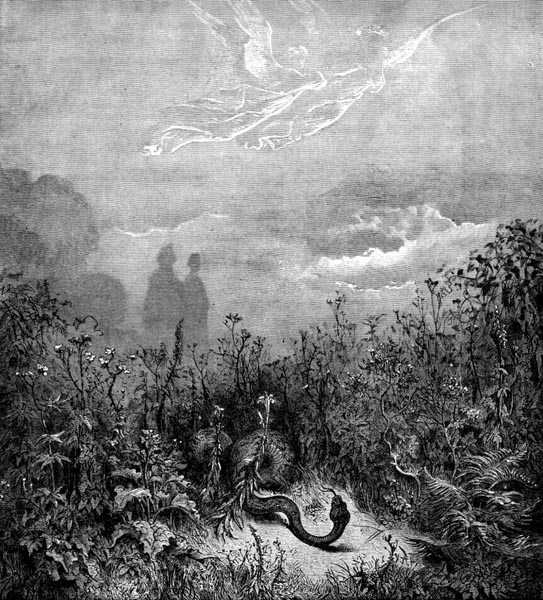
“Hearing the green wings cutting the air, the serpent fled, and the Angels wheeled round, flying as one, back to their places.” (Purgatorio VIII: 105—107)
Purgatorio Canto VIII:109-139 Conrad Malaspina
The shade who had drawn close to the Judge when he called, was not freed from gazing at me, for even a moment, during all that threat. He began: ‘May that lamp that leads you higher, find as much fuel, in your will, as is needed to reach the enamelled summit: if you know true news of Valdimagra, or its region, tell it to me, who was once mighty, there. I was called Conrad Malaspina: not the elder, but descended from him: I had that love for my own, that here is purified.’
I said to him: ‘O, I have never been through your lands, but where do men live throughout Europe, to whom they are not known? The fame that honours your house, proclaims its lords abroad, and proclaims their country, so that he, who has never been there, knows it. And, as I pray that I may go above, I swear to you, that your honoured race does not impair the glory of the coffer and the sword. Nature and custom grant it such privilege, that it alone walks rightly, and scorns the evil way, for all that a guilty head twists the world.’
And he: ‘Now go, since the sun will not rest, seven times, in Aries, that couch that the Ram covers, and straddles with all four feet, before this courteous opinion is fixed in your brain, with a deeper pinning than other men’s words, if the course of justice is not halted.’
Purgatorio Canto IX:1-33 Dante dreams he is clasped by an Eagle
Now the moon’s aurora, mistress of ancient Tithonus, was whitening at the eastern terrace, free of her lover’s arms; her forehead glittering with jewels, set in the form of the chill creature that stings people with its tail; and, where we were, Night had climbed two of the steps by which she mounts, and the third was already furling its wings; when I who had in me something of the old Adam, overcome by sleep, sank down on the grass, where all five of us were already seated.
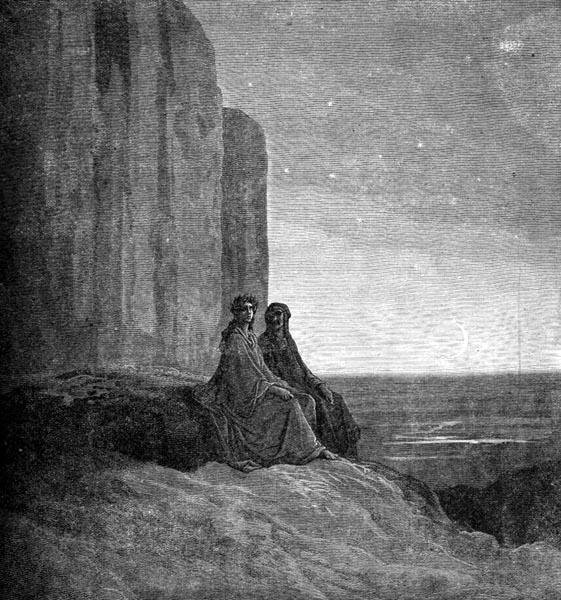
“Now the moon’s aurora, mistress of ancient Tithonus, was whitening at the eastern terrace, free of her lover’s arms.” (Purgatorio IX: 1—3)
At the hour, near dawn, when the swallow begins her sad songs, in memory, perhaps, of her former pain, and when the mind is almost prophetic, more of a wanderer from the body, and less imprisoned by thought, I imagined I saw an eagle, in a dream, poised in the sky, on outspread wings, with golden plumage, and intent to swoop. And I seemed to be there when Ganymede left his own, snatched up by Jupiter, to the high senate.
I thought, inwardly: ‘Perhaps, through custom, he only strikes here, and perhaps he disdains to carry anyone away in his talons from any other place.’ Then it seemed to me, that wheeling for a while, terrible as lightning, he descended, and snatched me upwards, as far as the sphere of fire. There he and I seemed to burn, and the flames of vision so scorched me, that my sleep was broken.
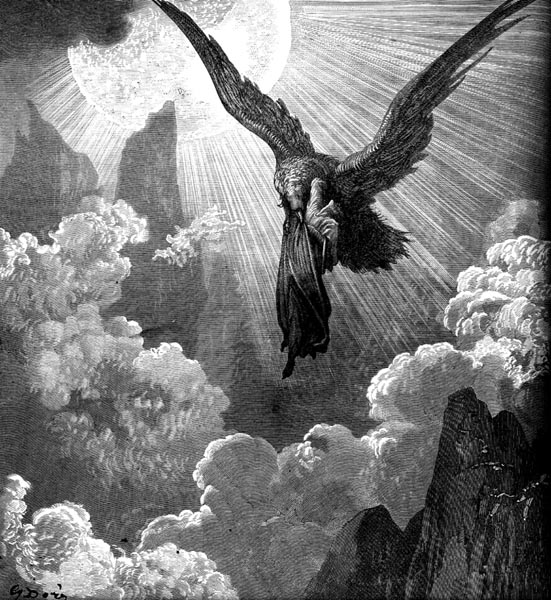
“There he and I seemed to burn, and the flames of vision so scorched me, that my sleep was broken.” (Purgatorio IX: 29—31)
Purgatorio Canto IX:34-63 Virgil explains
Achilles was no less startled, turning his waking eyes about, not knowing where he was, when Thetis, his mother, carried him away, in her arms, as he slept, from Chiron to the island of Scyros, the place from which the Greeks, later, made him go to the Trojan war, than I was as soon as sleep had left my face: and I grew pale, like a man chilled with fear. My comforter was the only one with me, and the sun was already more than two hours high, and my eyes were turned towards the sea.
My lord said: ‘Have no fear, be assured, since we are in a good position: do not shrink back, but put out all your strength. You have now reached Purgatory: there, see, the cliff that circles it: see the entrance, there, where it seems cleft.
Before, in the dawn, that precedes the day, when your spirit was asleep in you, among the flowers, with which it is all beautified below, a Lady came, and said: I am Lucia: Let me take this man, who sleeps, and I will help him on his way.’ Sordello was left behind with the other noble forms. She took you, and came on upwards, as day brightened, and I followed in her track. Here she placed you, and her lovely eyes first showed me that open passage: then she, and sleep, together, vanished.’
Purgatorio Canto IX:64-105 The Angel at the Gate of Purgatory
I felt changed, as a man in fear does who is reassured, and who exchanges comfort for fear, when the truth is revealed to him. When my leader saw me freed from anxiety, he moved up by the cliff, and I followed, towards the heights.
Reader, you know, clearly, that I must enrich my theme, so do not wonder if I support it with greater art. We drew close, and were at a point, just there where a break, like a fissure, that divides the cliff, first appeared to me. I saw a gate, and three steps, of various colours, below it, to reach it, and a keeper, who as yet said nothing. And as I looked closer, there, I saw that, seated as he was on the top step, there was that in his face I could not endure. He held a naked blade in his hand, that reflected the sun’s rays towards us, so that I turned my eyes towards it, often, but in vain.
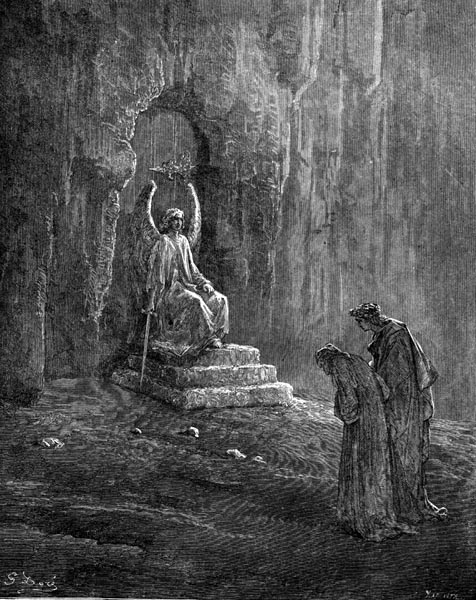
“…there was that in his face I could not endure.” (Purgatorio IX: 74)
He began to speak: ‘Say, what you want, from where you stand: where is your escort? Be careful that coming up here does not harm you!’ My master answered: ‘A heavenly Lady, who has good knowledge of these things, said to us, just now: ‘Go there, that is the gate.’ ‘And may she quicken your steps towards the good,’ the courteous doorkeeper began again: ‘come then, towards our stair.’
Where we came, the first step was of white marble, so smooth and polished that I was reflected there, as I appear. The second was darker than a dark blue-grey, of a rough, calcined stone, cracked in its length and breadth. The third, which is massed above them, seemed like red porphyry to me, fiery as blood spurting from an artery. God’s Angel kept both his feet on this, seated at the threshold, which seemed, to me, to be of adamantine stone.
Purgatorio Canto IX:106-145 The Angel opens the Gate
My guide led me, willingly, up the three steps, saying: ‘Ask humbly for the bolt to be drawn.’ I flung myself, devoutly, at the sacred feet: I begged him for pity’s sake to open the gate to me: but first I struck myself three times on the breast.
He inscribed seven letter P’s on my forehead, with the tip of his sword, and said: ‘Cleanse these wounds when you are inside.’ Ashes, or dry earth, would be at one with the colour of his robe, and he drew two keys out from under it. One was of gold, and the other of silver: he did that to the gate that satisfied me, first with the white, and then the yellow. He said: ‘Whenever one of these keys fails, so that it does not turn in the lock correctly, the way is not open. The one is more precious, but the other needs great skill and intellect, before it works, since it is the one that unties the knot. I hold them, for Peter, and he told me to err by opening it, rather than keeping it locked, if people humbled themselves at my feet.’
Then he pushed the door of the sacred gateway, saying: ‘Enter, but I let you know, that whoever looks behind, returns outside, again.’ The doors of the Tarpeian treasury, did not groan as harshly, or as much, when good Metellus was dragged from them, so that it remained poor afterwards, as the pivots of that sacred door, which are of strong and ringing metal, when they were turned in their sockets.
I turned, listening for a first sound, and seemed to hear Te Deum Laudamus, in a voice intermingled with sweet music. What I heard gave me just the kind of feeling we receive when people sing to the accompaniment of an organ, when the words are now clear, and now lost.
Purgatorio Canto X:1-45 The First Terrace: The Frieze: The Annunciation
When we were beyond the threshold of the gate, which the soul’s worse love neglects, making the crooked way seem straight instead, I heard it close again, with a ringing sound: but if I had turned my eyes towards it, what could have excused the fault?
We climbed through a broken rock, which was moving on this side and on that, like a wave that ebbs and flows. My leader began: ‘Here we must use a little skill, in keeping near, now here, now there, to the side that is receding’ And this made our steps so slow that the wandering circle of the moon regained its bed to sink again to rest, before we were out of that needle’s eye.
But when we were free, and in the open, above, where the Mount is set back, I, being weary, and both of us uncertain of our way, we stood still, on a level space, more lonely than a road through a desert. The length of three human bodies would span it, from its brink where it borders the void, to the foot of the high bank that ascends sheer. And this terrace appeared to me like that, as far as my eye could wing in flight, now to the left, and then to the right.
Our feet had not yet moved along it, when I saw that the encircling cliff, which, being vertical, lacked any means of ascent, was pure white marble, and beautified with friezes, so that not merely Polycletus, but Nature also, would be put to shame by it.
In front of us, so vividly sculpted, in a gentle attitude, that it did not seem a dumb image, the Angel Gabriel, appeared, who came to earth, with the annunciation of that peace, wept for, in vain, for so many years, that opened Heaven to us, after the long exile. You would have sworn he was saying: ‘Ave,’ since She was fashioned there, who turned the key to open the supreme Love. And these words were imprinted in her aspect, as clearly as a figure stamped in wax, Ecce ancilla Dei: behold the servant of God.
Purgatorio Canto X:46-72 King David dancing before the Ark
‘Do not keep your attention on one place alone’ said the sweet master, who had me on that side of him where the heart is: at which I moved my eyes about, and saw another story set in the rock, behind Mary, on the side where he was, who urged me onwards.
There, on the very marble, the cart and oxen were engraved, pulling the sacred Ark of the Covenant, which makes us fear, by Uzzah’s example, an office not committed to us. People appeared in front, and the whole crowd, divided into seven choirs, made one of my senses say ‘No’ they do not sing,’ another say ‘Yes, they do.’ Similarly, eyes and nose disagreed, between yes and no, over the smoke of incense depicted there.
There King David, the humble Psalmist, went, dancing, girt up, in front of the blessed tabernacle: and he was, in that moment, more, and less, than King. Michal, Saul’s daughter, was figured opposite, looking on: a woman sad and scornful. I moved my feet from the place where I stood, to look closely at another story, which shone white in front of me, beyond Michal.
Purgatorio Canto X:73-96 The Emperor Trajan
There the high glory of the Roman prince was retold whose worth moved Gregory to intercession, and to great victory: I speak of the Emperor Trajan: and at his bridle was a poor widow, in the attitude of tearfulness and grief. A crowd, of horsemen, trampling, appeared round him, and the gold eagles, above him, moved visibly in the wind. The poor woman, among all these, seemed to say: ‘My lord, give me vengeance for my son who was killed, at which my heart is pierced.’ And Trajan seemed to answer her: ‘Now, wait, till I return.’ And she, like a person, urgent with sorrow: ‘My lord, what if you do not return?’ And he: ‘One who will be in place of me will do it.’ And she: ‘What merit will another’s good deed be to you, if you forget your own?’ At which he said: ‘Now be comforted, since I must fulfil my duty before I go: justice wills it, and pity holds me here.’
He who never sees anything unfamiliar to him, made this speech visible, which is new to us, because it is not found here.
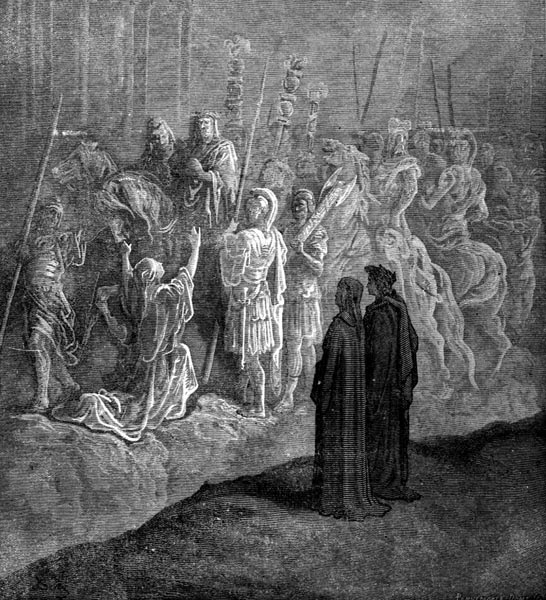
“…The poor woman, among all these, seemed to say: ‘My lord, give me vengeance for my son who was killed.’” (Purgatorio X: 82—84)
Purgatorio Canto X:97-139 The Proud and their Punishment
While I was joying in seeing the images, of such great humility, precious to look at, for their Maker’s sake, the poet murmured: ‘See, here, many people, but their steps are few: they will send us on to the high stairs.’ My eyes, that were intent on gazing to find new things, willingly, were not slow in turning towards him.
Reader, I would not wish you to be scared away from a good intention, by hearing how God wills that the debt is paid. Pay no attention to the form of the suffering: think of what follows it: think that, at worst, it cannot last beyond the great Judgement.
I began: ‘Master, those whom I see coming towards us do not seem like persons, but I do not know what they look like, my sight errs so much.’ And he to me: ‘The heavy weight of their punishment, doubles them to the ground, so that my eyes, at first, were troubled by them. But look steadily there, and disentangle with your sight what is coming beneath those stones: you can see, already, how each one beats his breast.’
O proud Christians, weary and wretched, who, infirm in the mind’s vision, put your trust in downward steps: do you not see that we are caterpillars, born to form the angelic butterfly, that flies to judgement without defence? Why does your mind soar to the heights, since you are defective insects, even as the caterpillar is, in which the form is lacking?
As a figure, with knees joined to chest, is sometimes seen, carved as a corbel, to support a ceiling or a roof, which though unreal, creates a real discomfort in those who see it, even so, I saw these, when I paid attention. Truly, they were more or less bent down, depending as to whether they were weighted more or less, and the one who had most patience in its bearing, seemed to say, weeping: ‘I can no more.’
Purgatorio Canto XI:1-36 The Proud paraphrase the Lord’s Prayer
‘O our Father, who are in Heaven, not because of your limitation, but because of the greater love you have for your first sublime works, praised be your name and worth by every creature, as it is fitting to give thanks for your sweet outpourings. May the peace of your kingdom come to us, since we cannot reach it by ourselves, despite all our intellect, if it does not come to us itself. As Angels sacrifice their will to yours, singing Hosanna: so may men sacrifice theirs. Give us this day our daily bread, without which he who labours to advance, goes backward, through this harsh desert. And forgive in loving-kindness, as we forgive everyone, the evil we have suffered, and judge us not by what we deserve. Do not test our virtue, that is easily conquered, against the ancient enemy, but deliver us from him who tempts it. And this last prayer, dear Lord, is not made on our behalf, since we do not need it, but for those we have left behind.’
So those shades, praying good speed to us and themselves, went on beneath their burdens, like those that we sometimes dream of, weary, and unequal in torment, all around the first terrace, purging away the mists of the world.
If ever a good word is said, there, for us, by those who have their will rooted in the good, what can we say or do for them, here? Truly we should help them wash away the stain, that they have carried from here, so that, light and pure, they might issue to the starry spheres.
Purgatorio Canto XI:37-72 Omberto Aldobrandeschi
Virgil said: ‘Ah, that justice and mercy might soon disburden you, so that you might spread your wings, that will lift you as you desire, show us, now, in which direction we might go, most quickly, to the stairway: and if there is more than one way, tell us which one ascends least steeply, because he, who comes along with me, is slow in climbing, despite his will, because of the burden of the flesh of Adam, he is clothed with.’
It was not obvious where the words came from, which were returned to those that he, whom I followed, had said, but this was the reply: ‘Come with us, to the right, along the cliff, and you will find the pass that a living man can ascend. And if I were not obstructed by the stone that weighs my proud neck down, so that I have to carry my head low, I would look at him, who is yet alive, who does not name himself, to see if I know him, and to make him pity this burden.
I was Italian, and the son of a great Tuscan: my father was Gugliemo Aldobrandesco: I do not know if his name was ever known to you. My ancestors’ ancient blood and noble actions, made me so arrogant that I held all men in such scorn, not thinking of our common mother, that it was the death of me, as the Sienese, and every child in Campagnatico, know. I am Omberto, and it is not me alone that pride does ill to, because it has dragged all my companions to misfortune. And here, until God is satisfied, I must carry this burden among the dead, since I did not do so among the living.’
Purgatorio Canto XI:73-117 Oderisi of Gubbio: The Vanity of Fame
Listening, I had bent my head down, and one of them, not he who was speaking, twisted himself beneath the weight that obstructed him: and saw me, and knew me, and was calling out, keeping his eyes fixed on me, who all bent down was moving along with them, with difficulty.
I said to him: ‘O, are you not Oderisi, the glory of Gubbio, and the glory of that art which in Paris they call ‘Illumination’?’ He said: ‘Brother, the leaves that Franco of Bologna paints are more pleasing: the glory is all his now, and mine in part. In truth, I would not have been so humble while I lived, because of the great desire to excel, that my heart was fixed on. Here the debt is paid for such pride: and I would still not be here, if it were not that, having power to sin, I turned to God.
O empty glory of human power: how short the green leaves at its summit last, even if it is not buried by dark ages! Cimabue thought to lead the field, in painting, and now Giotto is the cry, so that the other’s fame is eclipsed. Even so, one Guido, Cavalcanti, has taken from Guinicelli, the other, the glory of our language: and perhaps one is born who will chase both from the nest.
Worldly Fame is nothing but a breath of wind, that now blows here, and now there, and changes name as it changes direction. What more fame will you have, before a thousand years are gone, if you disburden yourself of your flesh when old, than if you had died before you were done with childish prattle? It is a shorter moment, in eternity, than the twinkling of an eye is to the orbit that circles slowest in Heaven.
All Tuscany rang with the noise of him who moves so slowly in front of me, along the road, and now there is hardly a whisper of him in Siena, where he was lord, when Florence’s fury was destroyed, when she was prouder then, than she is now degraded. Your Reputation is like the colour of the grass, that comes and goes, and he through whom it springs green from the earth, discolours it.’
Purgatorio Canto XI:118-142 Provenzan Salvani
And I to him: ‘Your true speech fills my heart with holy humility, and deflates my swollen pride, but who is he whom you were speaking of just now?’ He answered: ‘That is Provenzan Salvani, and he is here because he presumed to grasp all Siena in his hand. So he goes, and has gone, without rest, since he died: such coin they pay, to render satisfaction, who were too bold over there.’
And I: ‘If spirits who wait until the brink of death, before they repent, are down below, and do not climb up here, unless holy prayers help them, till as much time has passed as they once lived, how has his coming here been allowed him?’ He replied: ‘When he lived in highest state, he stationed himself in the marketplace at Siena, of his own free will, putting aside all shame, and made himself quiver in every vein, to deliver a friend from the pain he was suffering, in Charles’s prison.
I will say no more, and I know that I speak darkly, but a short time will pass and your neighbours will act such that you will be able to understand the beggar’s shame. That action released him from those confines.’
Purgatorio Canto XII:1-63 Many examples of Pride
I went alongside the burdened spirit, in step, like oxen under the yoke, as long as the sweet teacher allowed it. But when Virgil said: ‘Leave him, and press on, since here it is best if each drives on his boat with sail and oars, and all his strength,’ I stood erect, as required for walking, although my thoughts remained bowed down and humbled.
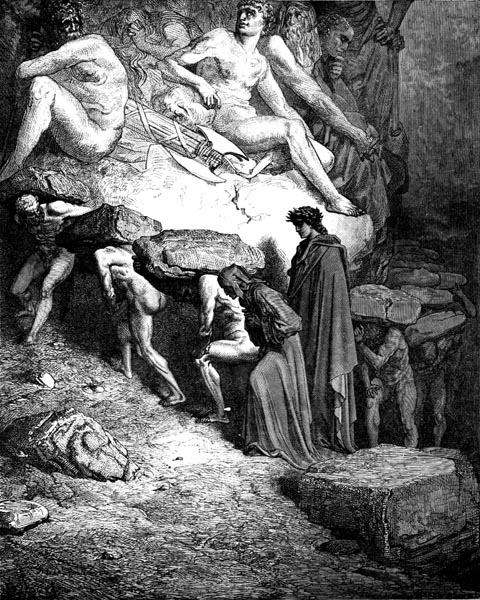
“I went alongside the burdened spirit, in step, like oxen under the yoke.” (Purgatorio XII: 1, 2)
I had moved, and was following, willingly, in my master’s steps, and both of us were already showing how much lighter of foot we were, when he said to me: ‘Turn your eyes downward: it will be good for you to look beneath your feet, to ease the journey. As tombstones in the ground, over the dead, carry the figures of who they were before, so that there may be a memory of them, and often cause men to weep for them, through that thorn of memory that only pricks the merciful, so I saw all the roadway that projects from the mountainside, sculpted in relief there, but of better likeness, because of the artistry.
On one side, I saw Satan, who was created far nobler than any other creature, falling like lightning from Heaven.
On the other side I saw Briareus, transfixed by the celestial thunderbolt, lying on the ground, heavy with the chill of death.
I saw Apollo Thymbraeus: I saw Mars and Pallas Athene, still armed, with Jupiter their father, gazing at the scattered limbs of the Giants.
I saw Nimrod at the foot of his great tower of Babel, as if bewildered, and looking at the people, who shared his pride, in Shinar.
O Niobe, with what sorrowful eyes I saw you sculpted in the roadway, between your seven dead sons and seven dead daughters!
O Saul, how you were shown there, dead by your own sword, on Gilboa, that never felt rain or dew after!
O foolish Arachne, already half spider, so I saw you, saddened, amongst the tatters of your work, woven by you to your own harm!
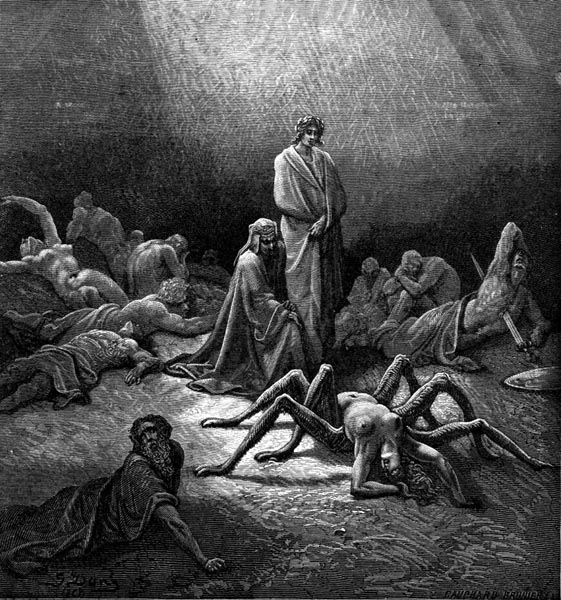
“O foolish Arachne, already half spider, so I saw you…” (Purgatorio XII: 43, 44)
O Rehoboam, now your image seems to threaten no longer, but a chariot carries you away, terrified, before chase is given!
Again, the hard pavement showed, how Alcmaeon made the gift of the luckless necklace costly to his mother Eriphyle.
It showed how Sennacherib’s sons flung themselves on him in the Temple, and how they left him there, dead.
It showed the cruel slaughter and destruction that Tomyris generated, at the time when she said, to the dead Cyrus: ‘You thirsted for blood, now take your fill of blood!’
It showed how the Assyrians fled in a rout, after Holofernes was killed, and also the remains of the murder.
I saw Troy in ashes and ruin: O Ilion, how low and debased, the sculpture, that is visible there, showed you.
Purgatorio Canto XII:64-99 The Angel of Humility
What master was it, of the brush, or the engraving tool, who drew the lines and shadows that would make every subtle intellect gaze at them? The dead seemed dead, and the living, living: he who saw the reality of all the tales I trod on, while I went by, bent down, saw no better than me. Be proud then, children of Eve, and on with your haughty faces, and do not bow your heads, in case you see your path of sin!
Already we had circled more of the Mount, and more of the sun’s path was spent, than the un-free mind judged so, when he, who was always going on, alert, in front of me, began to say: ‘Lift your head up, this is no time to go absorbed like that: see an Angel there who is preparing to come towards us: look how the sixth handmaiden is returning from her hour’s service. Be reverent in your bearing, and in your look, so that it may gladden him to send us on upward: consider, that this day never dawns again.’
I was well used to his warnings never to lose time, so that he could not speak to me unclearly on that matter. The beautiful creature came to us, robed in white, and, in his face, the aspect of the glimmering morning star. He opened his arms, and then spread his wings. He said: ‘Come: here are the steps, nearby, and the climb now is easily made.’ Few are those who do come, at this invitation. O human race, born to soar, why do you fall so, at a breath of wind?
He led us to where the rock was cleft: there he beat his wings against my forehead: then he promised me a safe journey.
Purgatorio Canto XII:100-136 The first letter P is now erased
As the ascent is broken on the right by steps, made in the times when the public records, and the standard measure, were safe, that climb the hill where San Miniato stands, looking down on Florence, that well-guided city, over the Ponte Rubaconte, so is this gully made easier, that here falls steeply from the next terrace, but so that the high rock grazes it on either side.
While we were changing our direction, voices sang, so sweetly no speech could describe it: ‘Beati pauperes spiritu, blessed are the poor in spirit.’ Ah! How different these openings are from Hell’s: here we enter with songs, and, down there, with savage groaning.
Now we were climbing by the sacred stair, and it seemed to me that I was much lighter, than I seemed to be on the terrace, at which I said: ‘Master, say, what heavy weight has been lifted from me, so that I hardly feel any effort in moving?’ He answered: ‘When the letter P’s, that have stayed on your face, but are almost invisible, shall be erased completely, like that first one, you feet will be so permeated by goodness, that not only will they not feel it as effort, but it will be a pleasure to them to be urged on.’
Then, like someone who goes along with something on their face, unknown to them, except when another’s gestures make them guess, so that the hand lends its help to make sure, searches, and finds, and carries out the task that cannot be done by looking, I, with the fingers of my right hand outspread, found only six letters, of those that he, the key-holder, had cut on me, over the temples: at which my guide, seeing it, smiled.
Purgatorio Canto XIII:1-45 The Second Terrace: The voices in the air
We were at the summit of the stairway, where the Mount, that frees us from evil by our ascent, is terraced for a second time. There a cornice, like the first, loops round the hill, except that its curve is sharper. There is no shadow there, or decoration: the cliff appears so naked, and the path level, with the livid colour of the stone.
The poet was saying: ‘If we wait here for people to ask our way of, I am afraid our decision may be delayed too long.’ Then he set his eyes intently on the sun: he made his right a pivot, and turned his left side, saying: ‘O sweet light, trusting in whom I enter on the new track, lead us on, as we, would be led, within ourselves: you give the world warmth, you shine upon it: if no other reason urges otherwise, your rays must always be our guide.’
We, by our eager will, in a short time, had already gone as far, there, as counts for a mile here, when we heard, not saw, spirits flying towards us, granting courteous invitations to love’s feast. The first voice that passed by in flight said loudly: ‘Vinum non habent: they have no wine,’ and went by, repeating it behind us.
And before it was completely lost to hearing, due to distance, another voice passed by, crying: ‘I am Orestes,’ and also did not stay. I said: ‘O, father, what voices are these,’ and as I asked, there was a third voice saying: ‘Love those who have shown you hatred.’ And the good master said: ‘This circle scourges the sin of Envy, and so the cords of the whip are made of Love. The curb or bit is of the opposite sound: I think you will hear it, I believe, before you reach the Pass of Forgiveness.
But fix your gaze steadily through the air, and you will see people seated in front of us, along the cliff.’
Purgatorio Canto XIII:46-84 The Envious and their Punishment
Then my eyes opened wider than before: I looked in front and saw shades with cloaks of the same colour as the stone. And when we were a little nearer, I heard a cry: ‘Mary, pray for us,’ and a cry: ‘Michael, Peter, and all the Saints.’
I do not believe there is anyone on earth so hardened, that they would not be pierced with compassion, at what I saw then: when I had come near them so that their features were clear to me, heavy tears were wrung from my eyes. They seemed to me to be covered with coarse haircloth: each supported the other with a shoulder: and each was supported, by the cliff.
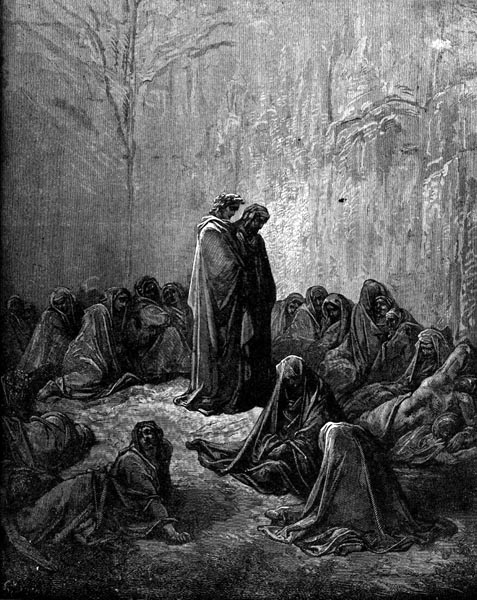
“They seemed to me to be covered with coarse haircloth: each supported the other with a shoulder: and each was supported, by the cliff.” (Purgatorio XIII: 58—60)
Like this, the blind, lacking means, sit near the confessionals, begging for alms, and sink their heads upon one another, so that pity may be stirred quickly in people, not only by their words, but by their aspects, that plead no less. And as the sun does not help the blind, so Heaven’s light will not be generous to the shades I speak of, since an iron wire pierces their eyelids, and stitches them completely shut, just as is done to a wild hawk, that will not stay still.
By seeing others, and not being seen, I felt I did them a wrong as I went by, at which I turned to Virgil. He knew well what the dumb would say, and so he did not wait for my question, but said: ‘Speak, and be brief, and to the point.’
My counsellor was with me on the side of the terrace where one might fall, since there is no parapet surrounding it: the devout shades were on the other side, who were squeezing out tears, through the terrible seam, so that they bathed their cheeks.
Purgatorio Canto XIII:85-154 Sapia de’ Saracini
I turned to them and began: ‘O people, certain to see the light, above, the only thing your desire cares for, may grace quickly clear the dark film of your conscience, so that memory’s stream may flow through it clearly: tell me, since it will be gracious and dear to me, if any soul among you is Italian, and perhaps it will bring him good if I know it.’
I seemed to hear this for answer, some way further on than where I was: ‘O my brother, we are all citizens of a true city: you mean those who lived as wanderers in Italy.’ So I made myself heard more distinctly towards that side. I saw a spirit among the others, hopeful in look, and if you ask: ‘How?’ its chin was lifted higher in the manner of a blind person.
‘Spirit,’ I said, ‘that does penance, in order to climb, if you are the one who replied, make yourself known to me by place or name.’ She answered: ‘I was of Siena, and purge my sinful life, with these others here, weeping to Him, that he might lend his grace to us. Sapia, I was named, though sapient I was not, and I was far happier in other’s harm, than in my own good fortune. And so that you do not think I mislead you, listen, and see if I was as foolish as I say.
Already when the arc of my years was declining, my townsmen were engaged in battle with their enemies, near to Colle, and I prayed God for what he had already willed. They were routed there, and rolled back in the bitterness of flight, and I joyed, above all, in watching the chase, so much so that I lifted my impudent face, crying out to God: “Now I no longer fear you,” as the blackbird does at a little fine weather.
I wished to make peace with God, at the end of my life, and my debt would not be reduced, even now, by penitence, had it not been that Pier Pettignano remembered me in his holy prayers, and grieved for me out of charity. But who are you, who go asking about our state, and, as I believe, have your eyes un-sewn, and breathing, speak?’
I said: ‘My eyes will yet be darkened here, but for only a short time, since they did little offence through being turned to envy. My soul is troubled by a far greater fear of the torment just below, since even now the burden there weighs on me.’ And she to me: ‘Who has led you then, up here, among us, if you expect to return below?’ And I: ‘He who is with me, here, and is silent: and I am alive, and so, spirit elect, ask something of me, if you wish me to move my mortal feet for you, over there.’
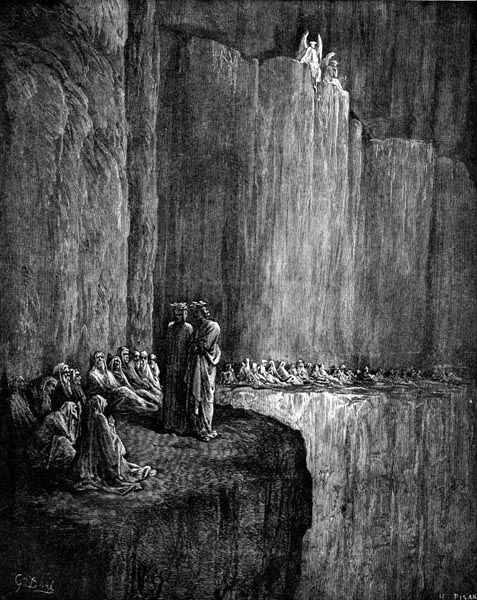
“‘Who has led you then, up here, among us, if you expect to return below?’” (Purgatorio XIII: 129, 130)
She answered: ‘Oh, this is such a strange thing to hear, that it is a sign that God loves you: so help me sometimes with your prayers. And I beg you, by all you most desire, if ever you tread the soil of Tuscany, renew my fame amongst my people. You will see them among that vain race, that put their faith in the harbour of Talamone, and will know more lost hopes there, than in searching for the stream of Diana: but the admirals will lose most.’
Purgatorio Canto XIV:1-27 Guido del Duca and Rinieri da Calboli
‘Who is this, that circles the Mount, before death has allowed him flight, and who opens and closes his eyelids at will?’ ‘I do not know who he is, but I know he is not alone. You, who are nearest, question him, and greet him gently, so that he might speak.’
So two spirits talked of me there, on the right, one leaning on the other: then held their faces up to speak to me: and one said: ‘O soul, still trapped in the body, journeying towards Heaven, out of charity, bring us consolation, and tell us where you come from, and who you are, since you make us wonder greatly at your state of grace, as a thing does that was never known before.’
And I: ‘A river runs through the centre of Tuscany, rising at Falterona, in the Apennines, and is not sated by a course of a hundred miles. I bring this body from its banks. It would be useless to tell you who I am, since my name does not sound much, as yet.’ Then, he who had spoken first, answered me: ‘If I penetrate your meaning clearly with my intellect, you are talking about the Arno.’ And the other said to him: ‘Why did he hide the name of the river, as one does with a dreadful thing?’
Purgatorio Canto XIV:28-66 The Valley of the Arno
And the shade who was asked the question replied as follows: ‘I do not know, but truly it is fit that the name of such a valley should die, since from its head, where the alpine chain from which Cape Faro in Sicily is separated, is so extensive, that there are few places where it exceeds that breadth, as far as Pisa, where it yields that which the sky absorbs from the sea, restoring that water that provides the rivers with what flows in them, Virtue, like a snake, is persecuted as an enemy, by them all, either because of the evil place, or the evil customs that incite them; so that the people, who live in that miserable valley, have changed their nature, until it seems as if Circe had them in her sty.
It first directs its feeble channel, among the Casentines, filthy hogs, more fitted for acorns than any other food created for man’s use. Then descending, it reaches the Aretines, curs that snarl more than their power merits, and turns its current, scornfully, away from them.
On it goes in its fall, and the greater the volume in its accursed ditch the more it finds the dogs grown to Florentine wolves. Having descended then, through many scooped-out pools, it finds the Pisan foxes, so full of deceit that they fear no tricks that might trap them.
I will not stop speaking even if this other hears me, and it would be well for him if he reminds himself, again, of what true prophecy unfolds to me. I see Fulcieri, his grandson, who is becoming a hunter of those Florentine wolves on the bank of the savage river, and who fills them all with terror. He sells their flesh while they are still alive, then slaughters them like worn-out cattle: he deprives many of life, and himself of honour. He comes out, bloodied, from the sad wood. He leaves it so that, a thousand years from now, it will not regenerate to its primal state.’
Purgatorio Canto XIV:67-123 Guido’s diatribe against Romagna
I saw the other shade, who had turned round to hear, grow troubled and sad, after it had heard these words, as the face of him who listens is troubled, at the announcement of heavy misfortunes, as to which side the danger might attack him from. The speech of the one, and the look of the other, made me long to know their names, and I asked them, mixing the request with prayers. At this the spirit who first spoke to me, began again: ‘You want me to condescend to do that for you, that you will not do for me, but, since God wills so much of his grace to shine in you, I will not be reticent with you: therefore know that I am Guido del Duca.
My blood was so consumed by envy, that you would have seen me suffused with lividness, if I saw a man render himself happy. I reap the straw of that sowing. O humankind, why set the heart there, where division of partnership must follow?
This is Rinier: this is the honour and glory of the House of Calboli, in which no one, since him, has made themselves heir to his worth. And not only is his bloodline devoid of the goodness demanded of truth and chivalry between the River Po and the mountains, the Adriatic shore and Reno, but the Romagna, that is within these boundaries, is choked with poisonous growth, that cultivation would now root out with difficulty.
Where is the good Lizio, and Arrigo Mainardi, Pier Traversaro or Guido di Carpigna? Oh, you Romagnols, turned to bastards, when will a Fabbro again take root in Bologna: when, in Faenza, a Bernadin da Fosco, scion of a low-born plant?
Do not wonder, Tuscan, if I weep, when I remember Ugolin d’Azzo, and Guido da Prata, who lived among us; Federico Tignoso, and his fellows, the Houses of Traversari, and Anastagi, both races now without an heir, the ladies and the knights, the toils and the ease, that love and courtesy made us wish for, there, where hearts are grown so sinful.
O town of Bertinoro, famous for your hospitality, why do you not vanish, since your noble families, and many of your people, are gone, to escape guilt? It is good that Bagnacavallo produces no more sons, and bad that Castrocaro, and worse that Conio, still trouble to beget such Counts. The Pagani will do well when Mainardo, their devil, is gone: but not, indeed, in that true witness of their lives will remain.
O Ugolin de’ Fantolin, your name is safe, since there is no more chance of there being any heir to blacken it through degeneration.
Purgatorio Canto XIV:124-151 Examples of Envy
Now, go your ways, Tuscan, since it delights me more to weep than talk, our conversation has so wrung my spirit.’ We knew that those dear shades heard us leave, so, by their silence, they gave us confidence in our road.
When we were left, journeying on, alone, a voice struck us, like lightning when it splits the air, saying: ‘Everyone who findeth me shall slay me’, and vanished like a thunderclap, that dies away when the cloud suddenly bursts.
When our hearing was free of it, behold, a second, with such a loud crash, that it was like thunder, following on quickly: ‘I am Aglauros, she, who was turned to stone.’ Then I made a backward step, not a forward one, to press close to the poet.
Now the air was quiet on all sides, and he said to me: ‘That was the harsh curb, that ought to keep humankind within its limits. But you take the bait, so that the old enemy’s hook draws you towards him, and the bridle and the lure are little use. The Heavens call to you, and circle round you, displaying their eternal splendours to you, but your eyes are only on the ground: for which, he who sees all things, chastises you.’